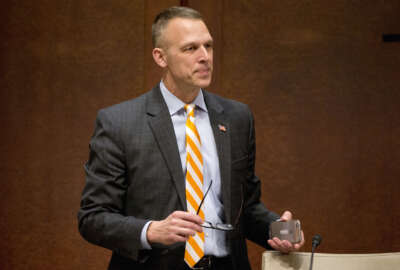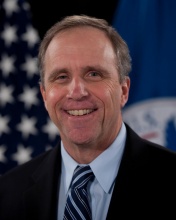

House Homeland Security Committee lawmakers tell DHS its fourth attempt to modernize financial systems has to be better.
The Homeland Security Department’s third attempt to modernize its financial management systems ended up costing 60 percent more than expected, is more than three years behind schedule and, in some ways, shows why moving large agencies to a federal shared service provider isn’t feasible.
But DHS Deputy Undersecretary for Management Chip Fulghum may have saved face before the House Homeland Security Committee yesterday by more clearly detailing the benefits the agency received from its three-year experiment with the Interior Business Center.
“We do have the foundation of a solution that works,” Fulghum told the committee. “The solution meets 75 percent of our requirements, and when release 3.0 comes in October, we will be over 80 percent. That’s how the system was originally designed.”
DHS attempted to be the first large agency to move its financial management systems to a federal shared service center under the Obama administration’s consolidation and modernization effort. DHS started with three components, the Transportation Security Administration, the Coast Guard and the Domestic Nuclear Detection Office. But DHS canceled its effort with the IBC earlier this year after deciding the initiative had too many problems, including a lack of standardization, poor communication and insufficient planning.
Instead, DHS decided to bring the current systems into its data center and hire a systems integrator to continue the modernization effort. The agency released a draft request for proposal through its EAGLE 2 contract vehicle earlier this summer.
Industry experts estimate DHS will spend another $100 million on the 20-percent solution.
Lawmakers say DHS already spent $133 million over the past three years with Interior.
“DHS has no idea how much it will cost in the end,” said Rep. Scott Perry (R-Pa.), chairman of the Subcommittee on Oversight and Management Efficiency. “It is proof that the Obama administration’s federal shared service provider concept was doomed for such a large agency. DHS is now rushing to implement a new strategy, which will likely put taxpayer dollars at risk of waste.”
Perry said after the hearing, he better understood why DHS failed, and now the committee can ensure they don’t make the same mistakes with the latest effort.
One of the biggest mistakes came from DHS’ partner, the Interior Department. Michele Singer, the director of the IBC, told lawmakers her predecessor underestimated what it would take to bring DHS on as a customer.
“IBC didn’t understand the complexity and needs of an agency like DHS. They were vastly larger than anything we had undertaken. Our 17 other agencies that reside on Oracle Federal Financial 12.1 use a common solution,” said Singer, who has been IBC director since June 2015. “The underestimation of the magnitude of the effort on both sides was real, but as the director of the shared service provider looking back over the record, I am extremely disappointed I had predecessors who didn’t recognize that at the time, and exercise more discipline internally in their own organization at IBC, as well as a provider with DHS to help prevent some of the delays and cost overruns.”
Perry said that admission by Singer was most surprising to him.
Additionally, Fulghum said IBC didn’t understand DHS’ business requirements and couldn’t hire enough staff to meet the demands of the transition.
At the same time, DHS also didn’t approach the shared services effort with all of its ducks in a row.
Fulghum said DHS didn’t have the right management or oversight for the transition program.
“When we originally set up the structure, we had three program offices with someone sitting over them, and it was three people with no one really in charge,” he said. “When we paused the program, I asked the now-acting CFO to take a hard look at ourselves to see what is it that we can do better. Out of that came a joint program office with one person who is accountable and in charge. From that perspective, I completely agree we were fragmented in terms of our communication and I believe we have fixed that now.”
Additionally, Fulghum said the new systems integrator contract will give DHS “clear visibility into cost and schedule.”
“I think we have learned lessons on the amount of testing we do. We will do more testing than what was done previously before Michele got there,” he said. “In addition to that, the contract structure that her predecessor put in place was complex, the relationships were complex, so we will have a much more simplified approach. The joint program office will give us one voice and one office that is running the entire project.”
Singer added two big lessons learned are that the customer agency needs to fully evaluate their business processes with an eye toward standardization, and they must train employees to work within the new systems and processes.
While Singer didn’t specifically say these were DHS problems, it was clear from her testimony and others that these were among the challenges in their relationship.
“I think the biggest risk for any large, federated agency — and the federated part is important because its component parts are vital, unique or brought in to be a part of the whole with their disparate systems and processes — will always be finding a baseline that as many of those component parts can live with as possible and meet their vital and important business needs, as well as be auditable and of sound financial organization,” Singer said. “I think no one is better situated than DHS headquarters to understand that need.”
Fulghum said under DHS’ new schedule, DNDO will migrate to the DHS data center by 2018, TSA will migrate by 2019 and the Coast Guard will have a new financial management system by 2021.
“We are finalizing our plan to transition from IBC’s data center to ours. Once that is finalized, we will go out on the street for an integration contractor. I expect that award by the end of October,” he said.
The timeline didn’t sit well with Perry.
“We will follow up on that and are dissatisfied with that timeframe,” he said. “It seems counterintuitive [that moving DNDO and TSA will take so long] and that’s why we will want to doublecheck to make sure that timeframe is realistic and there is a reason for it to make sense, as opposed to they are just trying to give themselves additional time.”
Fulghum said DHS aims to create an internal shared service, which eventually will provide financial management systems to three components. He said FEMA and the Immigration and Customs Enforcement component, which already provides financial management services to four other DHS bureaus, also will probably move to a similar model.
Perry said he was pleased to hear there are some deliverables from the $133 million investment, but he expects DHS to get it right and promised to keep an eye on things.
Copyright © 2025 Federal News Network. All rights reserved. This website is not intended for users located within the European Economic Area.
Jason Miller is executive editor of Federal News Network and directs news coverage on the people, policy and programs of the federal government.
Follow @jmillerWFED


